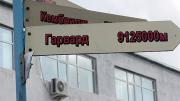Responding to a national committee of petitioners urging the city to recognize “one of the most important journalists of his generation,” the Cambridge City Council has designated a piece of real estate to honor David L. Halberstam ’55, who died in a car crash in 2007.
The city will dedicate Halberstam Square, at the fork in the road between Bow and Mount Auburn streets, at a public ceremony on October 6 at 4 p.m. Speakers at the event will be Cambridge mayor David Maher, Harvard Crimson president Peter Zhu ’11, Cambridge African-American Alliance president Renae Gray, Princeton professor Stanley Katz ’55, Ph.D. ’61, and Halberstam’s daughter, Julia. A reception at the Crimson will follow. As an undergraduate, David Halberstam reportedly spent 50 to 60 hours a week in that Plympton Street sanctum. He served as sports editor and ultimately as managing editor. “He wore a trench coat and drooped a cigarette out of the side of his mouth,” according to one account, to emulate not establishment men (as many classmates did), but “the old hard-drinking, underpaid, socially marginal news reporters of the past.” In the evening, the Institute of Politics will host a forum about the role of investigative journalism in social change.
Halberstam recalled that, after Harvard, “I had to learn how to go out and interview ordinary people.” He took a job at Mississippi’s smallest daily, the West Point Daily Times Leader. He moved on to the Nashville Tennessean and reported on the civil-rights movement. He covered the Vietnam War for the New York Times, shared a Pulitzer Prize for his work, and later, as a freelancer, wrote a bestseller about the war, The Best and the Brightest. He wrote many big books, on varied topics, but his “inner, secret favorite” work, he once revealed, was a small one, The Amateurs, about sculling.
Fellow journalist William Prochnau met Halberstam in Vietnam and described him to Brian Lamb, the host of C-Span’s Booknotes, as “a brilliant brat.…He was 28 years old. He was a man of great passions, great angers. He felt the government was deluding itself as much as deluding the American people. It drove him to fits.”
* * *
Imitation Greek. New Directions publisher James Laughlin ’36, in a cheerful posthumous collection, The Way It Wasn’t: From the Files of James Laughlin, tells this story about the late Harry Levin ’33 (who became a noted scholar of modernism and Babbitt professor of comparative literature) as a youngster: “Harry Levin, over the years the closest of my Harvard faculty friends, was still a non-teaching Junior Fellow when I was in college. My first recognition of his astounding mental powers came when the Classics Department put on Sophocles’ Philoctetes, in Greek, in the Lowell House common room. Robert Fitzgerald, already an accomplished classicist, took the lead. The other big part in the play is that of Neoptolemus, son of Achilles, who went with Odysseus to Lemnos to persuade Philoctetes, to whom Hercules had given his magic bow, to join the siege of Troy. The director was Milman Parry, the famous scholar who showed the survival of the Homeric epic in the contemporary oral poetry of Yugoslavia. A few days before the performance Neoptolemus fell ill. Parry had no understudy. But he had heard of Harry Levin’s fabulous memory. The story goes that Parry locked Levin in his study and taught him the whole long part phonetically. None of us who watched the play suspected that Harry was not a practiced Greek student. He was word and accent perfect.”









